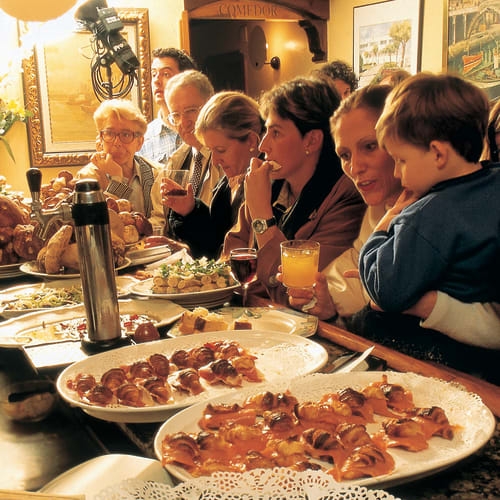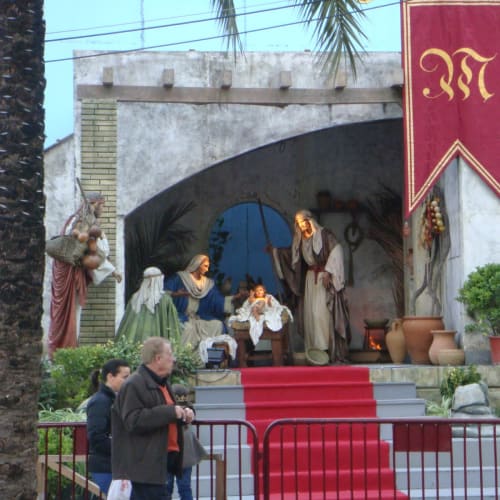Free Tuna with $75 Orders! Promo Code: TUNA
Mother and Child
December 2009




We can all recall a time when we have looked in awe at a precious, fragile newborn child – perhaps our own, or a cherished grandchild. No matter what our background, the tender image of a mother cradling the newborn infant reflects hope and life, and recalls the joy of loving families. It is a universal emotion: the fundamental one.
It is also the central theme of Christmas, Navidad – the birth, and why Silent Night is the all-time favorite carol: "all is calm; all is bright...mother and child. Sleep in heavenly peace." Soon the faithful in Spain will celebrate the light of God's love in the person of a newborn child.

Particularly in Spain this is no abstract concept. The centrality of mother’s love and the preciousness of her child are reflected in a culture where children are cherished, and are central to everyday life. Even families out for dinner at 11:00 PM will have their children playing near the table. Children are so central to the family that it is not unusual in a traditional Spanish home to find sons and daughters living at home well into their twenties.
This close and nurturing way of life is what attracted me to Spain and has affected the way we have raised our family. I understand there are similar cultures around the Mediterranean, where mothers have a unique place as do their children, but I have not experienced them first hand. On the other hand, I am well aware of cultures where this emphasis on the sanctity of the child is not the case; where children are to be "seen and not heard."
The difficulty now, even in Spain, is that the culture has evolved into a two income family structure, sometimes by choice as mothers pursue their personal careers and also because of economic necessity. The result is that many of us are unable to replicate the traditional home. But with dedication and commitment our children can be assured of their value.
To me, this is why this holiday season is so important. It is the time for us to enter into their world as best we can. Whether or not there is a religious setting such as Christmas or Chanukah, parents enjoying time with their children within the extended family is a deeply spiritual occasion. During this time of the year there is a natural human tendency to want to be closer together, to share each other’s warmth and hopes. That is why from antiquity, this is the season for children. In their joyful play and tender interactions they are oblivious to the long shadows. Children are pure life, as any grandparent understands most fully.
One of the nice things about the Spanish culture, and some Eastern Mediterranean countries, is that all twelve days of Christmas are celebrated leading up to Three Kings Day, Tres Reyes, on January 6. Their Christmas is not our abbreviated time leading up to an explosion of presents on December 25, followed by a rush to capitalize on the huge sales the next day!
During the several days and evenings after Christmas, Spanish families stop by the homes of uncles and aunts, grandparents and cousins to enjoy each other’s company while the little ones - cousins and brothers and sisters - are having a good time together. A few slices of jamón and a table full of holiday sweets: polvorones, mantecados, mazapán and other delicacies unique to the season make it a warm and welcoming occasion for the visiting family members.
My wife Ruth and I have had the pleasure of participating in Three Kings celebrations in various parts of Spain. We find it most enjoyable to be amongst the young parents and their children for the Three Kings Day parade on January 6. We have seen all sorts of variations - from the Cavalcade of the Wise Men (and their cart loads of candy) slowly proceeding along the ancient stone arcades of Santiago de Compostela, to a more simple but elegant parade of the Magi in Jerez de la Frontera, where some of the mothers jostled with the children to catch toys tossed to the crowd! Then there was the time we were in precious Guadalupe, deep in the mountains where the Wise Men approached the steps of the monastery on flat beds pulled by John Deere tractors!

Our favorite of all, which I wrote about a few years ago, was the arrival of the Three Kings in beautiful rural Trujillo, tucked in a corner of Extremadura. The town is off the beaten track so that there were no tourists, only excited local children with their parents and grandparents. As part of the cavalcade, many of the children saw their young fathers looking quite splendid as they rode into town erect in their saddles. The Wise Men arrived and mingled with the children giving them holiday treats. And in the center of the vast Plaza of the Conquistadores was a homemade Belén, a crèche, with a young local girl as Mary looking at her infant child, and a not completely convincing teenager as Joseph, attentively protecting the holy family.
Then off the families would go to their homes. Before going to bed they would set out hay for the camels, some food (and maybe a little sherry) for the Wise Men whom they expected would stop by their house in the dark of the night to leave special presents. With excitement the next morning the children would see what Gaspar, Melchior and Balthazar had left. When the excitement settled, they would gather at the family table to enjoy a special bread called Roscón de Reyes (the Ring of the Kings) and a cup of hot chocolate. El Rincón is a sweet bread studded with candied fruit, often with a prize placed in the dough by the baker.
I hope you have the opportunity to spend time with children, whether they are toddlers or soon to be young men and women. Time flies, and soon they will be on their way to discover the world. So don’t miss a moment while you can. Even grandchildren grow up! But they are so much fun as you see them view life with wonder. We have two granddaughters, ages 3 and 7, and two grandsons, ages 7 and 9. What fun it is to see them play together, and to see the uncles and aunts in action – not to mention the attentive mothers and fathers.
May all of you have a fulfilling holiday season, filled with family and love.
¡Feliz Navidad!
Don

